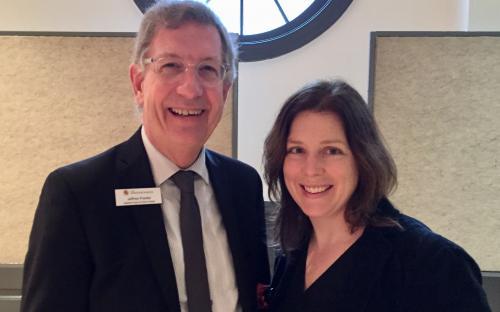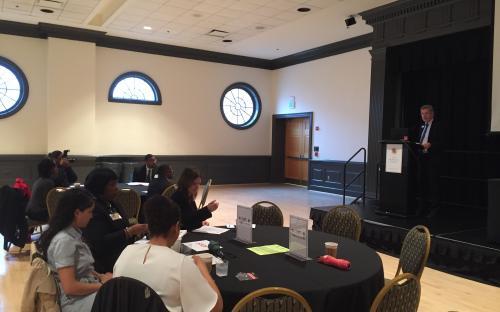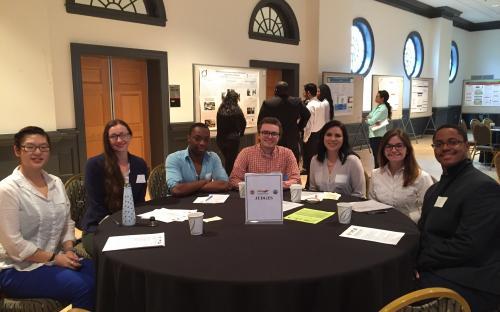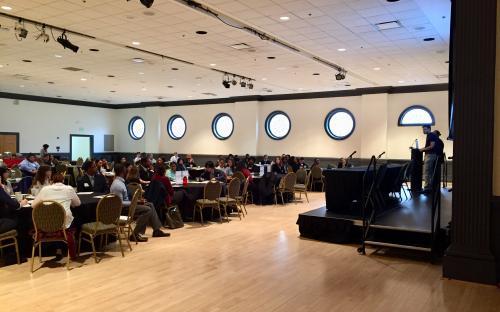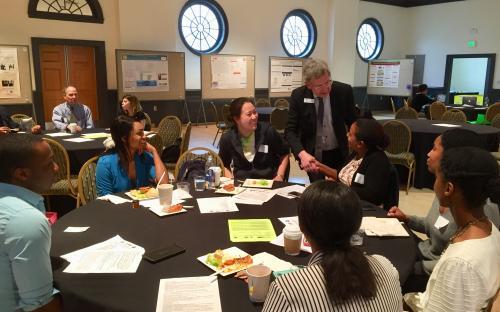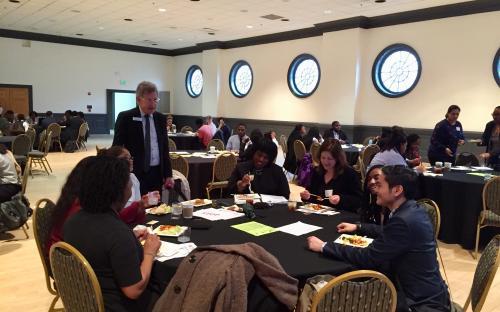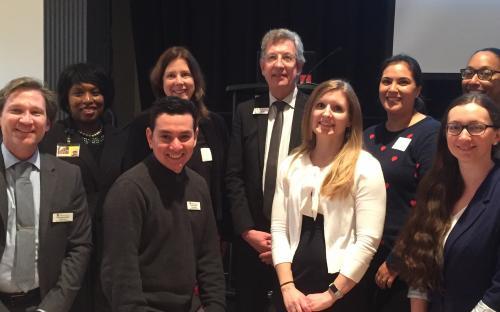 On February 15th, the Department of American Studies sponsored a program on Racial and Social Justice and Scholar|Student Activism. The event was open to the UMD community and featured American Studies graduate student Tatiana Benjamin as a panelist. Benjamin is completing a dissertation on the political representation of Black immigrants in the larger immigrant rights movement and has been active in organizations such as the UndocuBlack Network. The event began with a short panel that included Benjamin, an undergraduate student activist, and a faculty member. The majority of the event consisted of small group discussions of eight to ten staff, faculty, and students. "These small groups allowed for a deeper level of engagement around difficult questions and tensions associated with working toward racial and social justice in and out of the university context," observed Dr. Janelle Wong, one of the event's organizers.
On February 15th, the Department of American Studies sponsored a program on Racial and Social Justice and Scholar|Student Activism. The event was open to the UMD community and featured American Studies graduate student Tatiana Benjamin as a panelist. Benjamin is completing a dissertation on the political representation of Black immigrants in the larger immigrant rights movement and has been active in organizations such as the UndocuBlack Network. The event began with a short panel that included Benjamin, an undergraduate student activist, and a faculty member. The majority of the event consisted of small group discussions of eight to ten staff, faculty, and students. "These small groups allowed for a deeper level of engagement around difficult questions and tensions associated with working toward racial and social justice in and out of the university context," observed Dr. Janelle Wong, one of the event's organizers.
Society of McNair Fellows Established
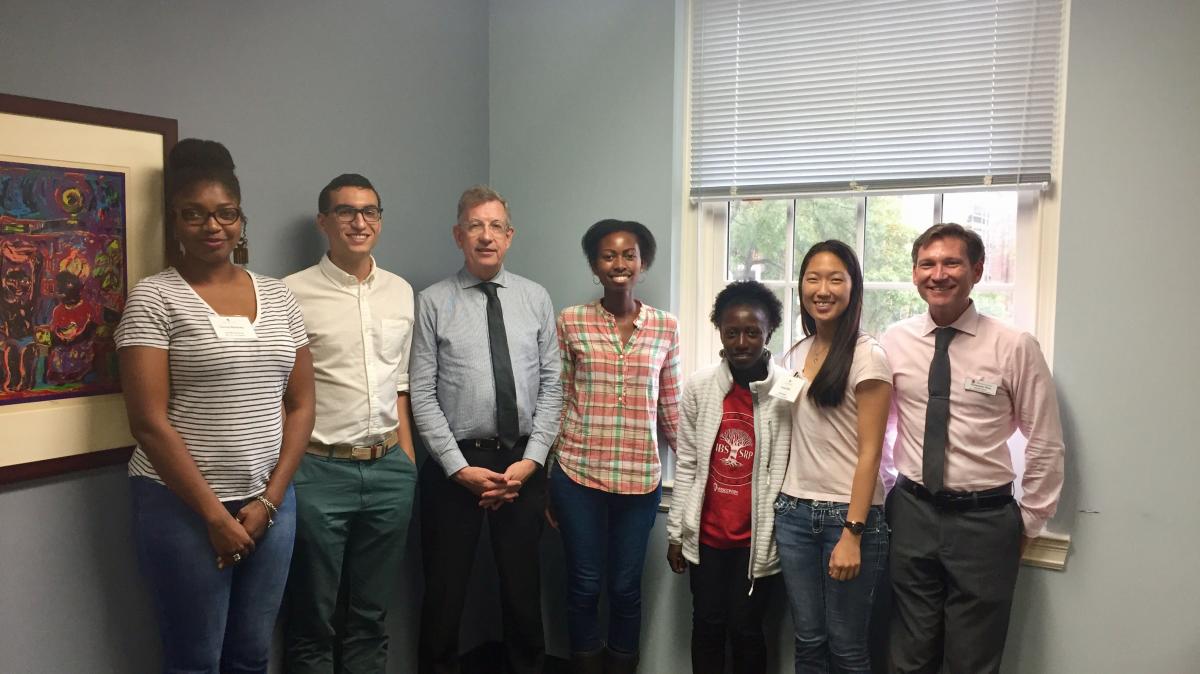 Since 2011, the Graduate School's Office of Funding Opportunities has awarded 36 McNair Graduate Fellowships. While this award comes with a generous financial package of over $40,000 over four years, its primary purpose is to enhance opportunities for doctoral programs to recruit and retain outstanding McNair alumni from institutions across the country. Two McNair Graduate Fellows, Dr. Shelby P. Cooley ('15, Human Development) and Dr. Marisa Franco ('17, Counseling Psychology), have successfully completed their doctoral degrees. Cooley is a Research Scientist for the The Road Map Project, supported by the Community Center for Education Results (CCER), a nonprofit organization based in Seattle. Franco just started her first year as an Assistant Professor of Counseling and Psychological Services at Georgia State University’s College of Education.
Since 2011, the Graduate School's Office of Funding Opportunities has awarded 36 McNair Graduate Fellowships. While this award comes with a generous financial package of over $40,000 over four years, its primary purpose is to enhance opportunities for doctoral programs to recruit and retain outstanding McNair alumni from institutions across the country. Two McNair Graduate Fellows, Dr. Shelby P. Cooley ('15, Human Development) and Dr. Marisa Franco ('17, Counseling Psychology), have successfully completed their doctoral degrees. Cooley is a Research Scientist for the The Road Map Project, supported by the Community Center for Education Results (CCER), a nonprofit organization based in Seattle. Franco just started her first year as an Assistant Professor of Counseling and Psychological Services at Georgia State University’s College of Education.
Once students arrive on campus, McNair Graduate Fellows are offered professional development and support through the Office of Graduate Diversity and Inclusion (OGDI). Programs generally include monthly workshop sessions throughout the year on mentoring, networking, work/life/school balance, and goal-setting.
And to recognize the significance of the McNair Graduate Fellowship's extensive co-curriculum, the program was recently minted the Society of McNair Fellows (SMF). "The investment by the fellows through the years has been phenomenal, and the feedback they have provided inspired us develop the idea of a formal program," says OGDI Associate Director Christopher Pérez. "The programmatic part of the McNair Graduate Fellows was designed to help build community among the particpants, but we also offer research oriented skill-building, and career planning objectives that help fellows sustain success during their doctoral study and after graduation," adds Pérez. More...
2018 University System of Maryland PROMISE AGEP Research Symposium and Professional Development Conference
The National Science Foundation’s Alliances for Graduate Education and the Professoriate (AGEP) program is intended to significantly increase the number of domestic students receiving doctoral degrees in the sciences, technology, engineering, and mathematics (STEM), with special emphasis on those population groups underrepresented in these fields. In addition, AGEP is particularly interested in increasing the number of minorities who will enter the professoriate in these disciplines. Specific objectives of the AGEP program are (1) to develop and implement innovative models for recruiting, mentoring, and retaining minority students in STEM doctoral programs, and (2) to develop effective strategies for identifying and supporting underrepresented minorities who want to pursue academic careers.
This year PROMISE invited undergraduate students to come to hear graduate students’ presentations and to participate in workshops that prepare them to be graduate students with an eye on becoming future faculty members. The conference sought to provide a venue that will allow students to present their work at any stage, receive feedback in preparation for presenting at larger venues, and provide training that will prepare participants for faculty careers. This year's successful event had 30 undergraduate and over 100 attendees.
"This year symposium was a particularly successful because we incorporated undergraduate students and other diversity prep programs, like LSAMP, in the programming. Anything we can do to collaborate and build the academic pipelines the better. We look forward to continuing these partnerships and growing this event," said Christopher Pérez, one of the organizers.
